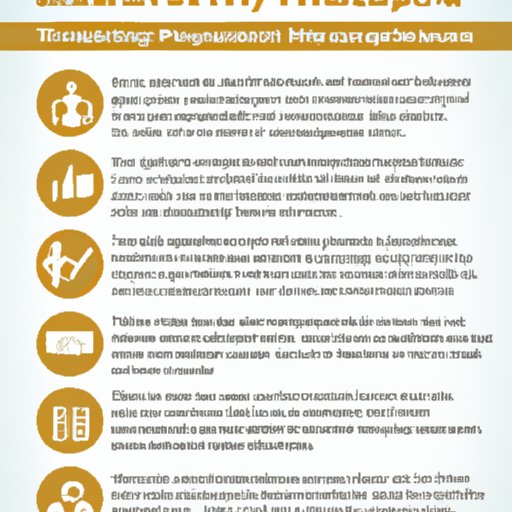Introduction
Health screening programmes are designed to identify any potential illnesses or risks in individuals before they become symptomatic. The goal of such programmes is to reduce the risk of developing a serious condition and to improve overall health outcomes. Generally, health screening programmes involve conducting tests on an individual or group of individuals to detect potential diseases or conditions.

Definition of Health Screening Programmes
Health screening programmes are preventive healthcare strategies that involve testing for specific diseases or conditions in order to detect them early and intervene before they become more serious. These programmes typically involve tests such as blood tests, imaging tests, and genetic testing. The purpose of these tests is to catch any signs of illness or disease before it becomes symptomatic.

Overview of the Benefits of Health Screening Programmes
The main benefit of health screening programmes is that they allow for early detection and intervention of diseases or conditions. This means that if a condition is detected early, it can be treated quickly and effectively, reducing the risk of complications and improving overall health outcomes. Health screening programmes can also help to identify risk factors for certain conditions, allowing people to make lifestyle changes to reduce their risk. Finally, health screening programmes can help to reduce the financial costs associated with treating diseases, as they enable earlier diagnosis and treatment.

Types of Health Screening Programmes
There are various types of health screening programmes available, including:
Blood Tests
Blood tests are one of the most common types of health screening programmes. They involve taking a sample of an individual’s blood and testing it for various markers, such as cholesterol levels, glucose levels, and other indicators of health. Blood tests can be used to screen for a wide range of conditions, from heart disease to diabetes.
Imaging Tests
Imaging tests involve using X-rays, CT scans, MRI scans, and other imaging techniques to look inside the body. These tests can be used to detect a wide range of conditions, from cancer to bone fractures. Imaging tests are often used in conjunction with other tests, such as blood tests, to get a more comprehensive picture of an individual’s health.
Genetic Testing
Genetic testing involves looking at an individual’s DNA to detect any potential risks for certain conditions. Genetic tests can be used to determine whether an individual has an increased risk of developing certain diseases, such as breast cancer or cystic fibrosis. These tests are sometimes used in combination with other tests, such as blood tests and imaging tests, to get a more accurate picture of an individual’s health.
Cost of Health Screening Programmes
The cost of health screening programmes depends on the type of test being performed and the size of the population being tested. Generally speaking, the cost of health screening programmes can vary from relatively inexpensive to quite expensive. Additionally, there are not only financial costs associated with health screening programmes, but also time costs. Depending on the type of test being performed, some health screening programmes may take several hours or even days to complete.

Pros and Cons of Health Screening Programmes
Like any healthcare strategy, health screening programmes have both potential benefits and potential risks. It is important to consider both when deciding whether or not to participate in a health screening programme.
Potential Benefits
The primary benefit of health screening programmes is that they allow for early detection and intervention of diseases or conditions. This can lead to improved health outcomes and a reduced risk of complications. Additionally, health screening programmes can help to identify risk factors for certain conditions, allowing people to make lifestyle changes to reduce their risk.
Potential Risks
The potential risks associated with health screening programmes include false positives, which can lead to unnecessary procedures or treatments; false negatives, which can result in delayed diagnosis and treatment; and the possibility of psychological harm due to anxiety or worry about the results. Additionally, health screening programmes can be expensive and time consuming, so it is important to weigh the potential benefits against the potential risks before deciding to participate in one.
Latest Advances in Health Screening Technologies
Recent advances in technology have made health screening programmes more accessible than ever before. Automated testing and wearables are two examples of how technology is making health screening programmes more efficient and cost effective.
Automated Testing
Automated testing involves using machines to perform tests, such as blood tests and imaging tests. This allows for faster and more accurate results, as well as reduced costs. Automated testing can also be used to collect data over time, allowing healthcare providers to monitor an individual’s health more closely.
Wearable Devices
Wearable devices, such as fitness trackers and smart watches, can be used to monitor an individual’s health in real time. These devices can track vital signs, such as heart rate and blood pressure, as well as activity levels and sleep patterns. This data can then be used to detect any potential issues and intervene before they become more serious.
How Health Screening Programmes Can Help Prevent Disease
Health screening programmes can be an effective way to prevent disease by detecting potential issues early and intervening before they become more serious. Early detection of a condition or disease can lead to quicker and more effective treatment, which can reduce the risk of complications and improve overall health outcomes. Additionally, health screening programmes can help to identify risk factors for certain conditions, allowing people to make lifestyle changes to reduce their risk.
Comparing Different Types of Health Screening Programmes Available
When considering a health screening programme, it is important to compare the different types of programmes available in order to find the best fit for your needs. Factors to consider when comparing different programmes include cost, efficiency, accuracy, and convenience.
Cost Comparison
The cost of health screening programmes varies depending on the type of test being performed and the size of the population being tested. It is important to compare the cost of different programmes in order to find the one that is most affordable.
Efficiency Comparison
It is also important to compare the efficiency of different programmes. Some programmes may take longer to complete than others, so it is important to consider how long each programme will take before deciding which one to use.
Conclusion
Health screening programmes are an effective way to detect potential illnesses or risks before they become symptomatic. These programmes involve conducting tests on an individual or group of individuals to detect potential diseases or conditions. There are various types of health screening programmes available, including blood tests, imaging tests, and genetic testing. The cost of health screening programmes can vary from relatively inexpensive to quite expensive, and there are both potential benefits and potential risks associated with these programmes. Recent advances in technology have made health screening programmes more accessible than ever before, and they can be an effective way to prevent disease by detecting potential issues early and intervening before they become more serious. When considering a health screening programme, it is important to compare the different types of programmes available in order to find the best fit for your needs.
(Note: Is this article not meeting your expectations? Do you have knowledge or insights to share? Unlock new opportunities and expand your reach by joining our authors team. Click Registration to join us and share your expertise with our readers.)
